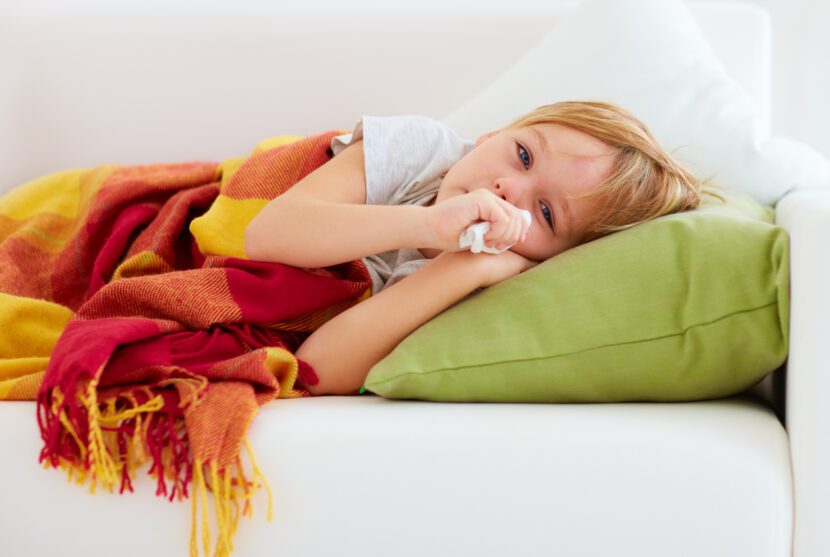Many parents struggle when their children fall ill during the winter months. When your little ones are unwell, it is easy to feel anxious and rush to the doctor at the first sign of a sniffle. After all, we just want to make sure that our family stays healthy and that our kids are not in danger of serious illnesses. Unfortunately, antibiotics are one of the most over-prescribed medicines for upper respiratory tract infections and are ineffective for colds and flu caused by viruses. While it is vital to get medical help when you feel unsure about your child’s health, it is also important to feel empowered to be able to administer simple home remedies for minor illnesses. In this article I will outline what to do in the case of fever, colds and coughs and suggest simple, kid-friendly lifestyle, nutritional and herbal advice to empower your family to heal naturally.
Fevers
Fevers are often feared by parents and for this reason a fever is too frequently suppressed using pharmaceuticals such as acetaminophen or ibuprofen. In our panic at seeing our child unwell, we forget that a fever is the body’s natural defense response to fight off infections. Fever is not a disease in itself and the rise in temperature actually helps the immune system to destroy the infection, slows the reproduction of viruses and bacteria and aids the detoxification of the body.
Fever is in fact a strong and vital sign that your child’s immune system is working well and doing its job!
However, if at any time you are concerned about your child’s fever it is always best to consult your doctor or healthcare professional.
| Always consult your doctor if: The temperature is higher than 103°F (39.5°C) and it does not respond to fever-reducing treatment. The child acts confused or loses consciousness. The child has rolling of the eyes or body twitching. The infant is under six weeks old. There is persistent fever accompanied by headache and stiff neck.  |
If a fever is under 101°F (38.5°C) give plenty of fluids that support the fever and the immune system and prevent dehydration. Warm fluids will encourage sweating which is a good thing. Food should be kept to a minimum, as your child’s appetite will be naturally suppressed during fever. Consider giving chicken or vegetable broth, miso soup, and warm herbal teas.
If the fever rises and persists over 101°F it may be necessary to manage the fever by giving herbs that promote sweating and cooling of the body such as those in the children’s fever tea.
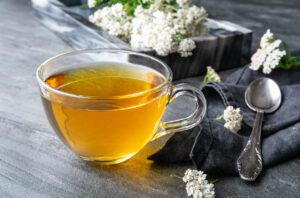
Children’s Fever Tea Recipe
1 part elder flowers
1 part linden flowers
1 part peppermint flowers
½ part catnip
½ part yarrow flowers
The tea can be sweetened with a little fruit juice or honey and served as warm as possible to enhance the diaphoretic (sweating) action. Other herbs could be added to the tea depending on the symptoms, include hyssop, marshmallow, or meadowsweet. For best results, consult your clinical herbalist to have a blend custom made for your child.
One of the most important things during fever is to make sure your child is not getting dehydrated. Important minerals such as sodium and potassium are necessary for electrolyte balance, which is why giving an electrolyte blend is more effective than just plain water in maintaining hydration.
Homemade Electrolyte Blend
1 quart of water
½ teaspoon of salt
½ teaspoon of baking soda
2-3 tablespoons of honey or in a child under one year substitute maple syrup or sugar
Juice of ½ a lemon
Let the feverish child drink 2-3 cups of this throughout the day. It will replace minerals lost through sweating and help prevent dehydration.
Herbal Sponge Bath
To lower your child’s fever naturally consider giving a tepid sponge bath using the above tea (make a strong infusion, strain, let cool and then add to the bath) or just sponge the child using a facecloth dipped into the tepid tea. If you don’t have the herbs to make a tea, even sponging with warm water will help lower the temperature.
The Common Cold
Colds are usually caused by a virus, and for this reason, antibiotics will not be an effective treatment for them. Antibiotics continue to be over-prescribed for viral infections and contribute to antibiotic resistant super-bugs and damaged gut flora. It’s comforting to know that a child with a healthy immune system will usually recover from a cold within 5-7 days without any specific treatment. However, supportive measures such as rest, fluids and a nutrient dense diet low in sugar will speed recovery. My favorite remedies for colds in children are Echinacea tincture and elderberry syrup.
Echinacea Tincture
Echinacea root has been shown to increase white blood cell activity and stimulates immune response. It is really effective in cases of colds and other upper respiratory tract infections. I prefer the alcohol-based tinctures to the glycerin-based extracts, which are often marketed for children. In my experience the alcohol extracts are stronger and better capture the active constituents of the plant. The amount of alcohol consumed is very minimal but if you are concerned, you could always add the tincture to a little hot water to evaporate off excess alcohol. I usually disguise Echinacea tincture into elderberry syrup for my kids. Make sure to use the right doses according to age.

| Echinacea Tincture Doses For Kids 2-5 years: 7.5 ml a day. Taken in divided doses this is ¾ teaspoon in a little water or elderberry syrup twice a day. 6-12 years: 10ml a day. Taken in divided doses this is about 1 teaspoon in a little water or elderberry syrup twice a day. 12+ and adults: 10-15ml a day. Taken in divided doses this is about a teaspoon in a little water or elderberry syrup 2-3 times a day.  |
Elderberry Syrup
Elderberries are packed with antioxidants, vitamin C and vitamin A. These tiny purple berries also have potent anti-viral and immune-boosting activity, which makes them perfect for both the prevention and treatment of colds and flu.
Elderberry syrup is a wonderful remedy for children mostly because it tastes so delicious! My children never turn it down and I use it often to disguise the taste of other herbal tinctures. In my experience, a daily dose of elderberry syrup helps prevent kids from suffering the seemingly endless rounds of sniffles and coughs that circulate in the classrooms during the winter. Frequent hand washing with good old soap and warm water helps too!
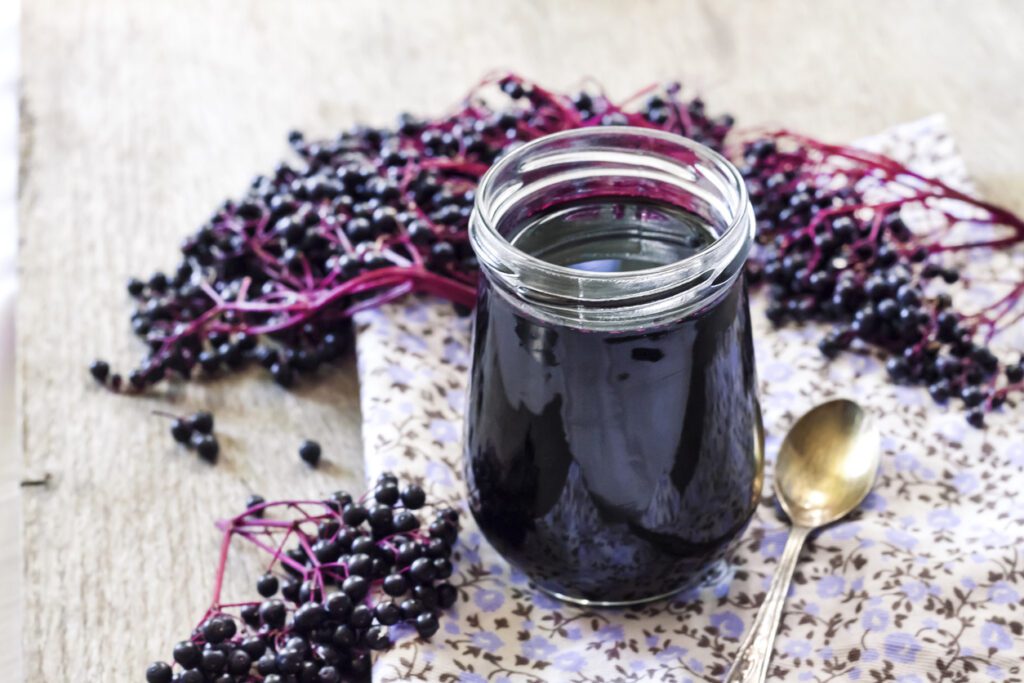
| Elderberry Syrup Recipe  1 cup of fresh or ½ cup of dried elderberries 3 whole cloves 1 stick of cinnamon 1/2 tablespoon of fresh, chopped ginger 3 cups of water 1 cup of raw honey Place the berries and spices in a saucepan and cover with the water. Simmer over low heat for 30-45 minutes or until the liquid is reduced by half. Smash the berries. Strain through a fine mesh strainer and add 1 cup of honey. Stir well. Bottle and store in the refrigerator. It will last 2-3 months when refrigerated. Give your child 1-2 teaspoons daily as a preventative and 1-2 teaspoons every 2-3 hours when feeling rundown or ill. |
Hot Lemon Ginger Garlic Tea
This is a time-honored recipe that is warming and soothing.
Bring 2 cups of water to the boil with about 3-4 slices of peeled fresh ginger root. If you don’t have time to boil the ginger, you can grate about a teaspoon of it and add it to the freshly boiled water.
Squeeze in the juice of half a lemon and a clove of crushed garlic.
Optional: Add honey or maple syrup to taste
Plenty of fluids such as water, herbal teas of aniseed, catnip, chamomile, elder flowers, eyebright, spearmint and hyssop should be offered to the child with a cold.
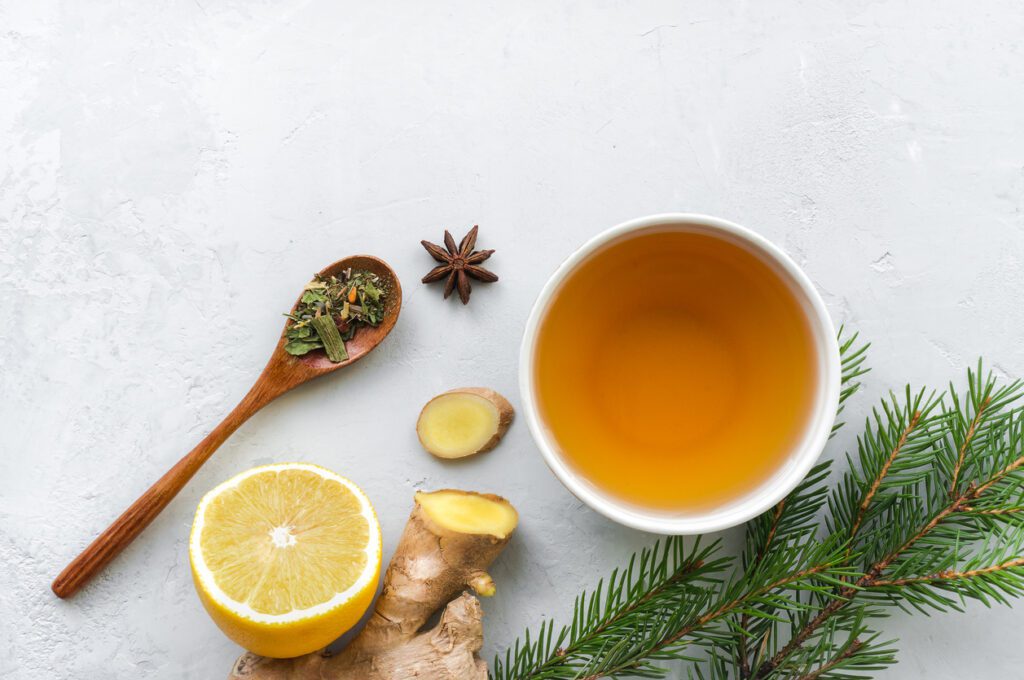
Congestion
A runny nose and head congestion can make a child feel pretty miserable. A favorite remedy for children who are old enough is to use an herbal steam (aged 5 and over).
Herbal Steam
Heat a large pot of water until steaming, add a drop or two of eucalyptus or peppermint essential oil, and have the child inhale the steam for 5-10 minutes until the sinuses open up. Cover the child’s head with a towel to increase exposure to the steam and instruct them to keep their eyes closed.
Humidifier
For younger children, a drop or two of the above essential oils could be placed in a humidifier in the bedroom.
Chest Rub
A vapor type balm or oil can be made and applied to the chest and back to help loosen lung and chest congestion. Aromatic herbs such as eucalyptus, hyssop, thyme, peppermint, camphor and rosemary can help to relieve congestion, help with spastic coughs and relax tight muscles.
Be very careful using essential oils on very young children as the powerful oils can be irritating to the eyes and tender young skin. Always dilute appropriately.
If you want to avoid essential oils, a hot water bottle can be applied to the back between the shoulder blades to help loosen lung congestion.
Sore Throat
A sore throat can be caused by any type of infection that affects the upper respiratory tract. Most are related to a virus, but sometimes they can be caused by bacteria. The most common bacterial infection is streptococcus which can be seen in a throat culture. If your child has a fever, a very red sore throat and swollen glands, see your doctor or healthcare professional.
A combination of immune supporting, demulcent (soothing) and lymph moving herbs are useful to fight sore throats.
| Soothing Throat Tea 1 teaspoon each of: Calendula flowers Elderberry Hyssop Licorice Linden Rosehips Sage leaf Slippery Elm bark  Take 4 teaspoons of the mixed herbs and add to 16 oz of freshly boiled water. Steep covered for 10 minutes. Strain, add honey if desired, and have the child drink it warm.  |
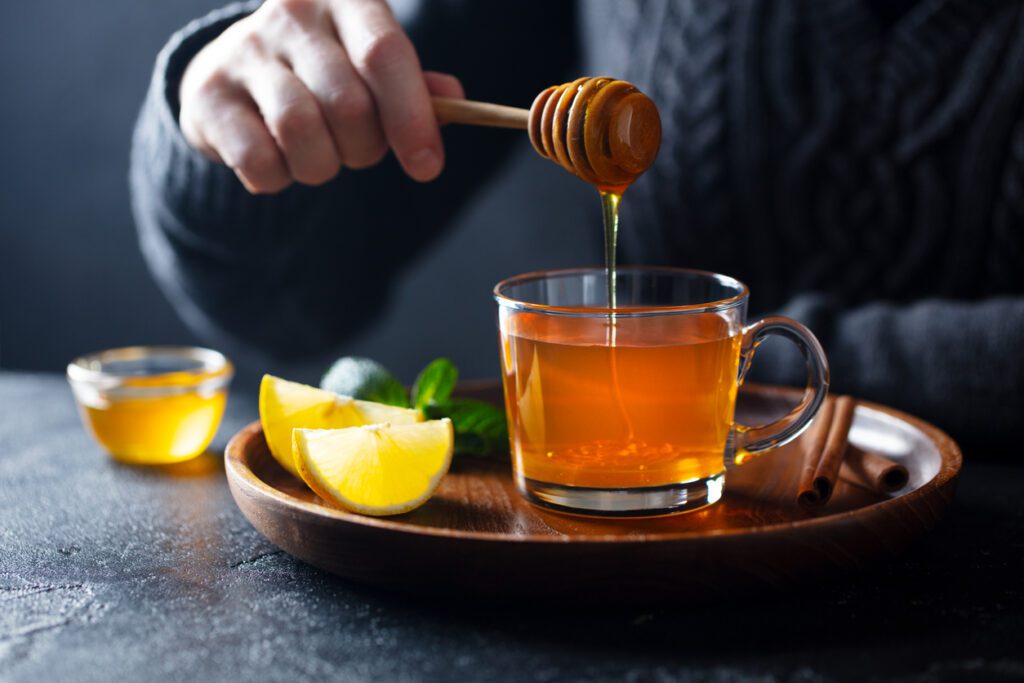
Coughs
Like fever, coughs are a natural reflex that guards the respiratory tract from foreign matter that may block or irritate the air passages. Most often, coughing is a useful way to clear excess mucous from the respiratory passages. However, when a cough is ineffective and interferes with sleep and causes exhaustion from muscular effort or leads to vomiting, it is time to take action.
First of all, it is useful to determine whether the cough is dry and irritating or wet and productive and choose a remedy to fit the type and cause of the cough.
Dry Coughs
These herbs soothe the irritated mucous membranes and are called demulcents: licorice, marshmallow root, plantain, slippery elm and elecampane. Adding skullcap, crampbark, lemon balm or linden might help if the cough is caused by a nervous irritation in the throat.
| Dry cough herbal tea: 1 teaspoon each of licorice root, marshmallow root, aniseed, and cinnamon bark. Add to 16 ounces of cold water, simmer gently for 10 minutes. Strain and sweeten, if desired. Â |
Wet Coughs
These herbs work to loosen and expel mucus from the chest and are called expectorants: hyssop, elecampane, thyme, aniseed and mullein are some examples.
| Wet cough herbal tea: 1 teaspoon each of mullein, thyme, aniseed, and plantain leaves. Pour 16 ounces of boiling water over the herbs and cover. Steep for 5 to 10 minutes, strain, and sweeten if desired  |
| Herbal cough syrups: Either of the two teas can be made into a yummy kid-approved syrup by taking the strained tea, adding an equal amount of raw sugar and boiling for 5 minutes. Cool and bottle. Give 10-30 drops in a little water for infants, 3-4 times a day. For children give ½ to 1 teaspoon, 3-4 times a day. |
The advantage of using sugar to make syrups is that it will keep longer without refrigeration. If you want to avoid sugar, you can add an equal part of honey to the warm tea (do not boil the honey). Store in the refrigerator for up to 2 months and do not give to infants under one year (due to the risk of botulism in honey).
Brandy, Lemon, and Honey
A simple, old-fashioned and time-honored remedy for irritable coughs.
Combine equal parts of each and give one teaspoon as needed (up to 3 teaspoons a day to avoid getting the child drunk!). This is good to give at bedtime, as the brandy will help children become drowsy and sleep.
Recurrent illnesses in children:
Sometimes, despite our best efforts our children become prone to recurrent illnesses and infections. This could be a sign that something deeper is going on with a child’s immune system and special nutritional, herbal and emotional support may be called for. In these cases I would highly recommend a consultation with a naturopath or other holistic healthcare provider to treat the causes of decreased vitality. Depending on your child’s individual case, herbs such as Astragalus and Ashwagandha can be useful to build deep immunity.
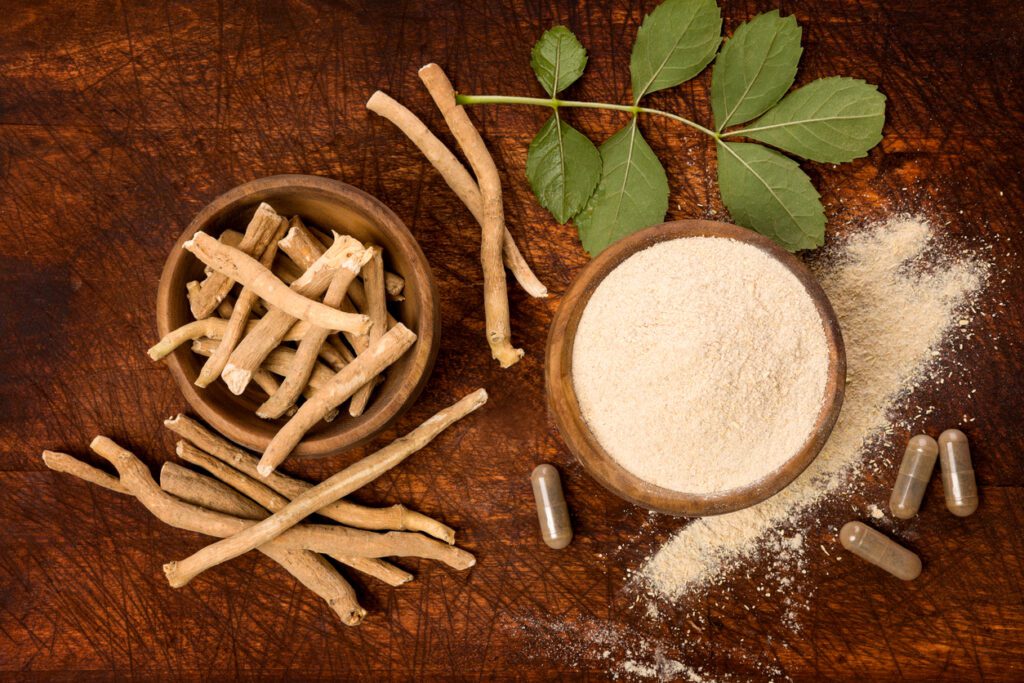
The forgotten art of convalescence:
A final word about wellness in these modern times…very often we look for a quick fix and lack patience for the healing power of nature to do its work. We have forgotten the importance of taking the time to recover from illnesses. The vital force, the immune system and the whole child needs adequate time to rest and heal after illness. Unfortunately, many parents cannot afford to take the time from their busy schedules to allow their child an extra few days off school to fully recover. This is detrimental to health and can contribute to the child relapsing into illness or worse still, suppress symptoms and drive the illness deeper.
Even though the symptoms of the illness are gone, it is advisable that a child rests for a full 24-48 hours after a fever/cold/sore throat etc before returning to school. In our increasingly fast-paced lives it becomes even more important to remember that convalescence is a powerful tool for our life-long health. Taking the time out now may save us from being forced to take even more time out in the future to deal with chronic and recurrent illnesses.
Best wishes for a healthy and happy winter with your children!
References:
Bove, Mary, An Encylcopedia of Natural Healing for Children and Infants, 2001, New York: McGraw-Hill
Gladstar, Rosemary, Herbal Remedies for Children’s Health, 1999, Storey Publishing.
Romm, Aviva J., Naturally Healthy Babies and Children, 2003, Berkeley: Celestial Arts.
Romm, Aviva J., Winterize Your Kids! Optimizing your health with Herbs, Diet and Common Sense, 2012, Webinar notes.
De La Foret, Rosalee., Herbal Remedies for Children During the Cold and Flu Season, 2012, e-book.
